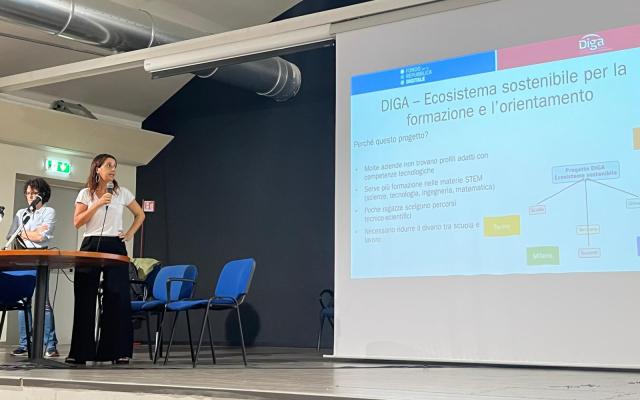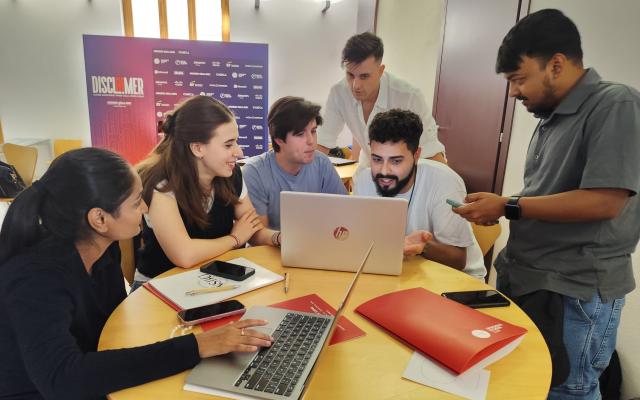Vagone FMD: the summary of the tenth meeting at Binario F
The intersection between innovation and art is giving rise to new artistic forms and a different way of experiencing performative activities. The metaverse makes various tools available to artists, creatives, designers, producers to build immersive virtual environments and experiences, with new languages and methods of engagement, giving further space to imagination and creativity. These new art forms can create greater emotional engagement by reaching very different audiences. The 10th meeting of Vagone FMD meeting. From 01 to 100 in the Metaverse, which took place last Wednesday, 15 February at Binario F, the focus was on innovation in visual arts and artistic performances. Here are the ideas that emerged in Riccardo Russo's synthesis.
INTRODUCTORY SESSION
Mirta Michilli, Director General, Fondazione Mondo Digitale - We have called these initiatives "Vagone FMD from 01 to 100" because we want to bring everyone here. We want to explain the opportunities related to economic development and the internet. We have been organizing these Wednesday events for a few months, which are not open to everyone, but only to a sector audience that shows great interest in the various topics we deal with from time to time. We aim to inform and interest participants as to how this new technology will revolutionize or innovate art and culture. We therefore want to understand if this new technological development can be an opportunity for this sector.
Costanza Andreini, Public Policy Manager, Meta Italy. Meta has allocated a lot of effort and huge economic investments because to the Metaverse. We firmly believe that it is a further step forward compared to the Internet. It is important now to discuss what its rules and opportunities will be, but also who will be part of it. The metaverse will not consist of just the few companies that have the opportunity to invest but will have to be open to many different realities.
Francesco Dobrovich, Creative Director, Videocittà - this space is completely immersive. Currently, it is a bit of cumbersome world, but we hope that in the future it will become more accessible. Videocittà is a reality that observes innovations with great interest, working mainly with audiovisuals. We believe that this is the real key to the Metaverse. Any type of future application will have to go through the visual development of virtual images and atmospheres. These experiences always seem like an object of desire. On the one hand, there are highly advanced technologies that amaze with their design; on the other hand, those who focus on content rather than aesthetics. The more artistic technology is the more it is interesting. It will be essential to work on emotions. It is a world of opportunities and will require a multidisciplinary exercise, crossing different skills and cross-media planning.
Massimo Canducci, Chief Innovation Officer Engineering - the concept of the metaverse is still ethereal, despite the fact that there are some fairly well-established definitions. Many believe that the metaverse will never happen; on the other hand, some are afraid that we will disconnect from physical reality and migrate into a completely virtual dimension. Today, the metaverse does not exist because there is a lack of technology, which will have to evolve further. We currently have many experiments and applications that are struggling to coordinate with each other and become interoperable, but above all there is still a lot to be accomplished in terms of the interaction between humans and machines. By defining Meta Quests, you will realize that you could lose contact with physical reality. There are limitations. It is a completely different type of use to what we are used to. A fundamental theme is that of respect for users. Today, we are surrounded by applications that pose ethical issues. Some, for example, stimulate addiction, so it will be even more delicate when they are no longer only available on smartphones.
Valentino Catricalà, Curator, MODAL Gallery, Manchester SODA, and Professor, IULM University of Milan. There is still a lot of confusion on the subject, so it is essential to put these new technologies in order. The term we use - metaverse - is peremptory, but it is nothing new if we consider it from a theoretical-conceptual point of view. The artist is not only the one who represents a given cultural situation, as artists have inhabited this world before others, but above all they have tried to inhabit it with their ideas and their peculiarities. The metaverse was immediately treated as a matter of marketing and market, which has left little room for creativity. In fact, it is no coincidence that it boomed during the pandemic: now it will be interesting to see what the developments will be. The goal of the artist is to create new communities of interaction, which obviously do not avoid market issues, but do bring them to a deeper level of content.
Chiara Passa, visual artist - I have been working with these techniques and devices since the 1990s. I work with immersive reality to understand its intrinsic language, creating virtual spaces that intersect with real space, to question the very idea of reality. I create dynamic and virtual places that lead the viewer to confront new spaces and new identities. I like to think that the first cyberspace process was introduced by Descartes, with Cartesian spaces. In the 90s, the first metaverse project was the invention of the programming language to create metaverses, i.e., online spaces. The metaverse is an ongoing project and must find a meeting point for interoperability. As artists, we build virtual worlds and experiences using different platforms, so we need to improve the user fruition process.
BRAINSTORMING
Angelo Sidori, Head of Communications, Institut Français Italy - we are extremely interested in technological evolution, both in terms of cultural and artistic promotion, but also of educational and scientific research. There are certainly prospects for building future projects.
Annalisa Falcone, Archaeology Manager, Central Institute for Archaeology - this new reality is significant for the field of archaeology. It fascinates us, but at the same time it scares us. The risk is mainly linked to a very imaginative visualization of history, to a rereading that may not correspond to reality. We must use this technology but avoid indulging in simplistic reconstructions.
Valeria Acconcia, Archaeology Manager, Central Institute for Archaeology- various metaverse projects have been launched at the Ministry of Culture. A recently created one concerns the entire Appia Antica Park. These new technologies are useful for enhancing and increasing the potential for the use of cultural heritage and archaeological areas. Moreover, it will be necessary to identify a use of the metaverse for other areas: for example, for the safeguarding of cultural heritage.
Francesca Sereno, Assistant to the Special Commissioner, Teatro - Rome - it is important to hold events like these to collect ideas, especially in the field of education and training. I have dealt with video games, and I realize the potential they have, especially from an educational point of view.
Mariagrazia Pontorno, Professor, Florence Academy of Fine Arts - every artist is already a metaverse. The metaverse is a way to visualize an inner universe. There are applications other than the artistic field that require a different type of rigor (I am thinking of cultural heritage and medicine), but I still believe that this new technology is a natural evolution of the human journey. The difference between nature and artifice is nothing but a label. I conclude by hoping that as many metaverses emerge as there are ideas.
Chiara Passa, visual artist - to create new ways of fruition, I believe we need to take art to unexplored places. That's why we brought it to the metaverse. It provides an extra quid as an intimate dimension of a work of art can be established. Experiencing this dimension allows one to penetrate the work of art to its point of origin, letting the viewer enter the frame that gives rise to the entire structure. There are so many inspiring outcomes on the subject.
Andrea Fiorito, sound designer - I witness a great deal of formal performance, but the artistic aspect ends there, the form becomes everything and turns into substance. I often notice the complete absence of feeling. I think artists find themselves crushed by technological circumstances and this in a sense suffocates an intrinsic need in art that transcends formality. There is a risk of remaining derivatives of technology and not, on the contrary, of opening new horizons for the artist. However, it is still an infancy of technology, but I hope that this gap will be bridged very soon.
Filippo Riniolo - visual artist and Rome Municipality V Councillor - I don't think that past art is outdated. I believe that artists, in confronting all the technology of history, have confronted themselves not so much with grammar but with the meaning and with the philosophical consequences of meaning that access to technology provides to humanity. The issue is therefore to understand this same meaning, that is, the why, not the how. Where we want to go is a question on which we need to debate. It is clear that technology has an ontological appeal, and we never arrive without grammar anyway. We arrive there with a corpus of symbols and meanings.
Alessandro Cracolici - new media artist and NABA Professor - I think we currently build on languages that already exist, as language is still clear and resists. Things are not flat, we are living them, everything that makes us feel alive is beautiful.
Giulia Ghia, Councillor for Cultural Policies, Rome Municipality I - the metaverse will have to be dealt with. It is a reality that must help us understand its meaning. The metaverse is a tool that can greatly help a city like Rome, to get to know its seven layers. However, I see some limits. The first that comes to mind is that it is another world for people who can see. I would expect greater inclusiveness so that these immersive realities can be developed through all the senses.
Gianluca Masciangelo, Managing Director, Nextlevel Media - I find everything we talked about today a starting point for a new sensitivity and renewal. The metaverse is a gateway to a new world that we are building, and it will be able to teach us to open ourselves to possibilities that we already have in our minds.




